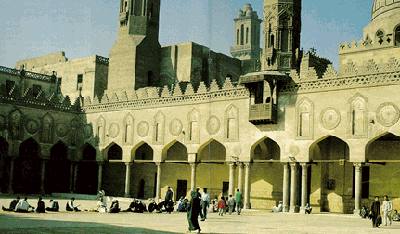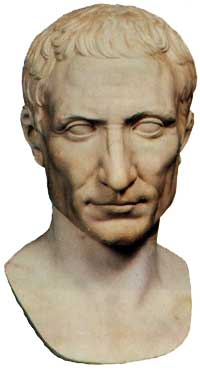|
A Maldive correspondent at the el-Azhar Seminary in Cairo
has kindly provided feedback to our recent article
on the Maldive Calendar. El-Azhar is the
premier Islamic centre of indoctrination in the world and
the oldest of its kind. Several very senior individuals in
the current ruling entity in the Maldives undertook their
mullah indoctrination in that institution.
Feedback
"Hi,
"Nice work, but there is a question bedevils my mind.
As you know in both the Bible and the Koran religious festivals
are regulated by the lunar calendar. Jews and Muslims have
kept to these regulations which they believe to be from God.
I wonder why does Christianity follow a solar calendar?
regards"
 Mosque of the el-Azhar
Seminary, Cairo, Egypt
Mosque of the el-Azhar
Seminary, Cairo, Egypt |
Our
reply
 Julius Caesar
Julius Caesar |
The Jews, like the pre-Islamic Arabs have
a luni-solar calendar. That is to say that the months are
determined by the lunar cycle and any discrepancy with the
solar year is made up by leap months. This was pretty much
standard practice in the ancient world. The Egyptians, the
Chinese and the Romans (before the Julian reform) had similar
arrangements. In some cases the leap month was as long as
the other months and occurred about every third year. In other
cases the leap month was 10-11 days long and occurred every
year. As I have indicated in the article, the insertion of
the leap month was arbitrary at least in the case of the Arabs
and this led to exploitation by the priests and the sheikhs.
This was what led to the abolition of the leap month by Mohamed.
Given this, it is obvious why ancient festivals such as the
Rosh HaShanah (Ra-es el-Sanah), Yom Kippur (Yowm el-Kaffaarah),
Passover (Yowm el-Faseeh), the Chinese new year and so on
are observed according to lunar months subject to a relative
position in the solar year. In other words, unlike the Islamic
festivals these other festivals, based on the lunar calendar,
do not move around the year even though they may vary over
about a month within the solar year.
There are only 3 Christian festivals that are determined by
the purely solar year, namely Christmas, All Saints and Epiphany.
Christianity, as you may be aware, originated in the Roman
Empire and these festivals were fixed after the calendar reform
of Julius Caesar. Christianity was formalised nearly 400 years
after the adoption of the Julian calendar in the Roman Empire.
Nevertheless the remaining eight Christian festivals are determined
according to the lunar cycle. They are: Easter, Ash Wednesday,
Palm Sunday, Maundy Thursday, Good Friday, Ascension, Pentecost
and Trinity Sunday. The last seven are fixed relative to Easter.
Like the Jewish festivals and unlike the Islamic ones, Easter
(which more or less coincides with the Jewish Passover) is
luni-solar. Easter occurs on the first Sunday following the
first ecclesiastical full moon (which could be a day out from
the astronomical full moon) following the ecclesiastical vernal
equinox (which again could be a day out from the astronomical
equinox). It is the vernal equinox that makes it solar and
the full moon that makes it lunar.
Jewish
festivals |
Purim
Pesach (Passover)
Shavuot (Pentecost)
Rosh HaShanah (New Year)
Yom Kippur
Succot
Simchat Torah
Chanukah |
|
|
It is, therefore, not correct to say that
the Jews and the Muslims on the one hand have kept to divinely
prescribed festivals determined by the lunar calendar while
Christians have not. Muslim festivals are determined by a
purely lunar calendar, while Jewish and eight out of the eleven
Christian festivals are determined by a luni-solar calendar.
When the Jewish festivals (including Passover which coincides
with Easter) were fixed, the civil calendar was luni-solar.
When the immovable Christian festivals (e.g.: Christmas) were
set, the relativity of the civil calendar to the lunar cycle
no longer existed.
The Islamic festivals were set according to a calendar which,
for the first time in civilised human history, removed the
relativity with the solar cycle. A simple formula could have
been devised such as what the Chinese, the Hebrews, the Romans
and others had done before, to settle the leap month or leap
days, instead of resorting to the knee-jerk solution of removing
the relativity of the year to the solar cycle.
That way the Islamic calendar could have remained a sensible
one that could be observed in practice.

Back
to the page on Maldive Calendar
|

